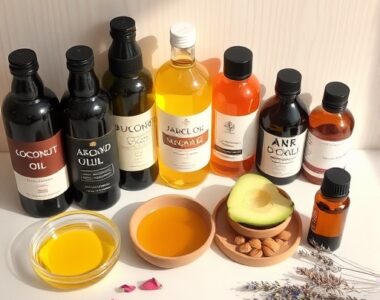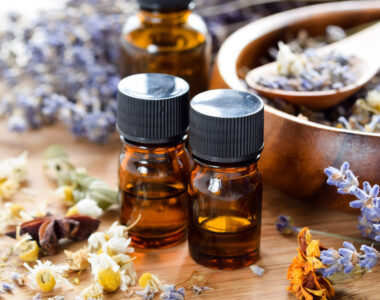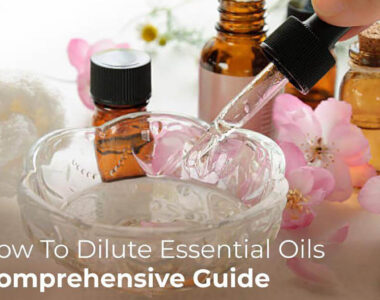Start an exciting journey into aromatherapy and discover the amazing benefits of essential oils. These concentrated plant extracts are called “nature’s potent allies.” They have many therapeutic properties that can greatly improve our wellness and holistic health.
They can help with anxiety, mood, inflammation, and natural healing. Essential oils are incredibly versatile.
In this detailed guide, we’ll dive into the history, science, and uses of these plant-based wonders. Whether you’re already into them or just starting, you’ll find lots of useful information. You’ll learn how to use essential oils in your everyday life.
Key Takeaways
- Essential oils are highly concentrated plant extracts with powerful therapeutic properties.
- They can be used for a wide range of physical and mental health benefits, including stress relief, mood enhancement, and natural healing.
- Essential oils are versatile and can be used in various ways, such as diffusion, topical application, and household applications.
- Proper dilution and safety precautions are crucial when using essential oils to ensure safe and effective use.
- The growing popularity of essential oils has led to their increased use by healthcare professionals across various disciplines.
Understanding Essential Oils: Nature’s Concentrated Power
Essential oils are highly concentrated plant extracts. They are packed with powerful phytochemicals and plant compounds. These oils are the essence of the plants from which they are derived, distilled or extracted through various methods. It takes an enormous amount of plant material to produce small quantities of essential oil, making them exceptionally potent.
What Makes Essential Oils So Potent
For instance, it takes approximately 250 pounds of lavender flowers to yield just 1 pound of lavender essential oil. Similarly, 5,000 pounds of rose petals or lemon balm are required to produce a mere 1 pound of their respective oils. This high concentration of plant compounds is what gives essential oils their robust therapeutic properties.
The Science Behind Plant Extractions
Essential oils interact with the body primarily through compounds like terpenes, aldehydes, esters, and phenols (3). These phytochemicals possess a wide range of biological activities, such as antimicrobial and antiviral properties (2,3). Carrier oils are often used to dilute essential oils, helping prevent skin irritation and allowing for safe topical application.
Historical Uses Through Centuries
The use of essential oils has deep roots in traditional medicine systems around the world. For centuries, these concentrated plant extracts have been valued for their diverse therapeutic benefits, from wound healing and skin care to respiratory support and emotional well-being. As modern research continues to unveil the power of phytochemicals, essential oils are gaining renewed popularity in holistic and integrative health practices.
“Essential oils are the lifeblood of plants, containing the very essence of a plant’s natural fragrance and therapeutic properties.” – Dr. Mehmet Oz
Top Essential Oils and Their Therapeutic Properties
Essential oils, like lavender and peppermint, offer many health benefits. They can improve our well-being in many ways. Let’s look at some of the best essential oils and how they help us.
Lavender oil helps with stress, pain, and sleep. Tea tree oil fights acne and athlete’s foot with its antiseptic and antimicrobial properties.
Peppermint oil eases headaches, boosts energy, and aids digestion. Eucalyptus oil clears nasal congestion and fights infections.
“Frankincense oil reduces inflammation and boosts mood. Lemon oil manages anxiety, depression, and pain, and fights bacteria.”
Each essential oil has its own benefits and uses. They can be used on the skin or inhaled. Exploring these natural wonders can greatly improve our health.
To use essential oils effectively, know their scents and health benefits. From lavender‘s calmness to peppermint‘s energy, they can meet your health needs.
Essential Oil Aroma Families
Essential oils fall into different aroma families. Each family has its own benefits:
- Camphoraceous: Stimulating, refreshing, and focus-enhancing
- Floral: Comforting, sleep-inducing, and mood-balancing
- Woody/Earthy: Grounding, uplifting, emotionally balancing, and aphrodisiac
- Citrus: Energizing, uplifting, and emotionally balancing
- Spicy: Bracing, rousing, crisp, and penetrating
- Resinous/Musky: Grounding, relaxing, uplifting, and intimate
- Minty: Motivating, cooling, invigorating, and mentally clarifying
- Herbaceous: Calming, positivity-enhancing, emotionally balancing, and grounding
Knowing the unique qualities of each essential oil helps you create custom blends. This way, you can tailor your wellness experiences to your needs.
The Art of Aromatherapy: Methods and Applications
Aromatherapy uses essential oils to boost health and happiness. It’s a natural way to care for yourself. Popular ways to use essential oils include diffusion, direct inhalation, and room sprays.
Diffusion Techniques
Essential oil diffusers are common in homes and offices. They spread essential oils into the air. This lets the scent fill the space, improving mood and focus.
Direct Inhalation Methods
Direct inhalation means breathing in essential oils straight from the bottle. It’s great for the lungs, helping with breathing and congestion.
Room Sprays and Atmospheric Uses
Room sprays and spritzers are easy to use. Mix essential oils with water in a spray bottle. This makes natural air fresheners that brighten up any room.
Each method has its own benefits. Aromatherapy works by using smells to affect our mood and health. It’s a powerful way to feel better.
“Aromatherapy is a powerful tool for promoting emotional well-being and natural healing.”
Safe Application and Dilution Guidelines
When using essential oils, it’s important to dilute them properly. Most essential oils need to be mixed with a carrier oil like coconut or jojoba oil. This helps prevent skin irritation. The right amount of dilution depends on the essential oil and how you plan to use it.
For example, tea tree oil can be used directly on acne. But citrus oils might make your skin more sensitive to the sun. Always do a patch test before applying essential oils to your skin to check for skin sensitivity.
In aromatherapy, make sure to follow the diffuser’s instructions for the oil-to-water ratio. It’s not safe to eat essential oils without a professional’s advice. They can be harmful if taken internally.
| Dilution Range | Application | Concentration |
|---|---|---|
| Range 1 | Sensitivity issues, impaired skin | 0.2-1% |
| Range 2 | Facial cosmetics and deodorants | 0.5-1.2% |
| Range 3 | Body oils and lotions | 1-3% |
| Range 4 | Bath products | 2-4% |
| Range 5 | Acne spot treatment, wound healing | 2-10% |
Following the right dilution guidelines is key to safe and effective use of essential oils. Whether for skin application or aromatherapy, always consult a healthcare professional if you have concerns.
Essential Oils for Mental Wellness and Emotional Balance
In today’s fast world, keeping our emotions balanced is tough. But, essential oils offer a natural way to ease anxiety, depression, and insomnia. They help us stay mentally well.
Stress Relief and Relaxation
Lavender, bergamot, and ylang-ylang oils are great for stress relief. They can be used in a diffuser or applied on the skin (diluted). These oils calm the mind, lower stress hormones, and bring peace.
Mood Enhancement Properties
Citrus oils like lemon and orange boost mood and fight anxiety and depression. Their uplifting scents make us feel happier and more positive.
Sleep Support Solutions
For insomnia, cedarwood and lavender oils are key. Diffusing them before bed helps sleep by calming and relaxing us.
Other oils like peppermint, frankincense, and chamomile also help with emotional health. Peppermint boosts energy and focus. Frankincense reduces stress and improves mood. Chamomile soothes anxiety and depression.
Adding these oils to your daily life can improve your mental wellness and emotional balance. Use them in diffusers, apply them on skin, or add them to baths.
Physical Health Benefits and Natural Healing
Essential oils have amazing healing powers. They can help with pain relief and inflammation reduction. These plant extracts are natural remedies for many health issues.
Peppermint oil can ease headaches and digestive problems. Eucalyptus oil helps with breathing issues and pain. Tea tree oil fights skin infections with its antifungal and antibacterial properties.
Ginger oil is good for digestive health and can lessen nausea. Frankincense has anti-inflammatory effects and may help with asthma. Lemongrass oil might lower blood sugar in type 2 diabetes.
Rosemary oil could help with hair growth and joint pain. These are just a few ways essential oils can help our bodies as natural healing options.
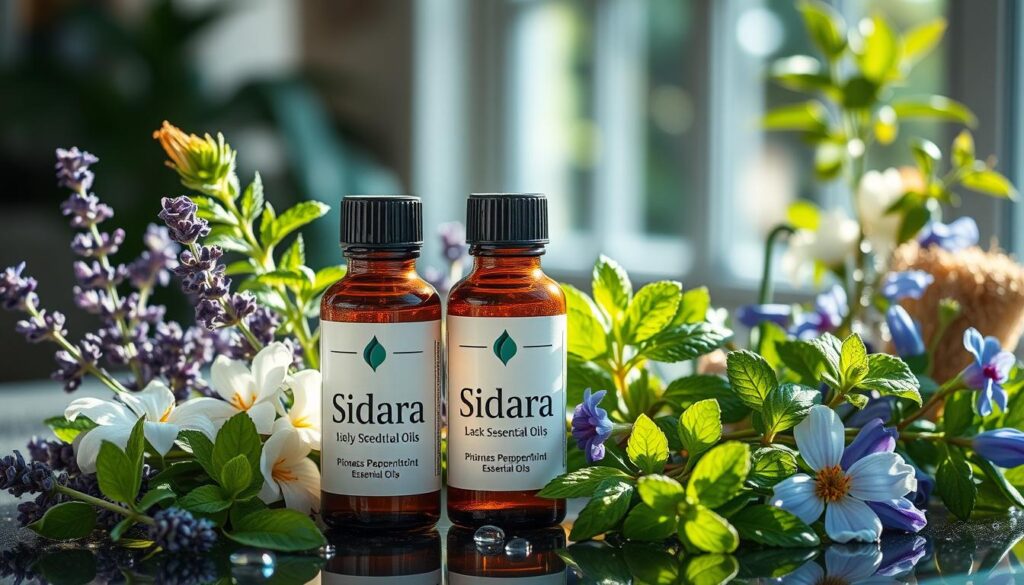
“Essential oils have the power to profoundly impact our physical well-being, providing natural solutions for a wide range of health concerns.”
Common Essential Oils and Their Daily Uses
Essential oils are more than just strong plant extracts. They can make our daily lives better in many ways. They can be used in the kitchen and bathroom, making our lives simpler and more enjoyable.
Kitchen and Cooking Applications
Culinary essential oils like lemon, lime, and orange can spice up your cooking and baking. Just a few drops can add amazing flavors to your dishes. For better digestion, try adding peppermint and ginger oils to your drinks.
Home Cleaning Solutions
Essential oils are great for natural cleaning. Tea tree, lemon, and lavender oils fight germs well. Use them in your homemade cleaners for a fresh, chemical-free home.
Personal Care Routines
Essential oils can also improve our personal care routines. Lavender oil can make bath time relaxing. Tea tree oil helps with acne. Rosemary oil can help your hair grow.
Remember to use essential oils wisely and only use food-grade oils in cooking. With a bit of creativity, these natural oils can make our daily lives better.
| Essential Oil | Daily Applications |
|---|---|
| Balsam Peru | Hydration, clear airways, mental awareness |
| Cedarwood | Calming properties, stress relief, sleep support, circulatory system |
| Grapefruit | Refreshing, detoxifying, astringent |
| Peppermint | Energizing, stimulating, revitalizing |
| Lavender | Sleep support, mood improvement, skin soothing |
“Essential oils can transform our daily lives in remarkable ways, from enhancing the flavors of our meals to creating a soothing, spa-like atmosphere in our homes.”
Safety Precautions and Contraindications
Essential oils are powerful but need careful handling. They can be up to 100 times more concentrated than in nature. This makes them potentially toxic if not used right.
Some essential oils, like lemongrass and cinnamon bark, can irritate the skin. Using them undiluted can cause problems. This can even make your immune system react badly, making you avoid certain oils forever.
Never put essential oils in your eyes or ears. They can cause burns and even temporary blindness. Drinking them can irritate your mouth and stomach. Also, don’t breathe them in for more than 15-20 minutes.
- Keep essential oils away from kids and pets to avoid accidents.
- Dilute essential oils to 5% or less, depending on age and use.
- Always do a patch test before using essential oils on your skin.
- Stay away from peppermint and eucalyptus around young kids.
- If you’re pregnant, have epilepsy or asthma, or take meds, talk to a doctor first.
Essential oils can affect how medicines work and might not be safe for everyone. Always put safety first and get advice from a pro before using them.
| Essential Oil | Potential Risks |
|---|---|
| Peppermint | Not recommended for use around infants and young children |
| Eucalyptus | Not recommended for use around infants and young children |
| Tea Tree | May cause skin irritation, not recommended for use on children under 2 |
| Cinnamon | Can cause skin irritation, avoid during pregnancy |
| Clove | Can cause skin irritation, avoid during pregnancy |
By following safety rules and getting advice, you can enjoy essential oils safely. Essential oil safety is key for a good experience.
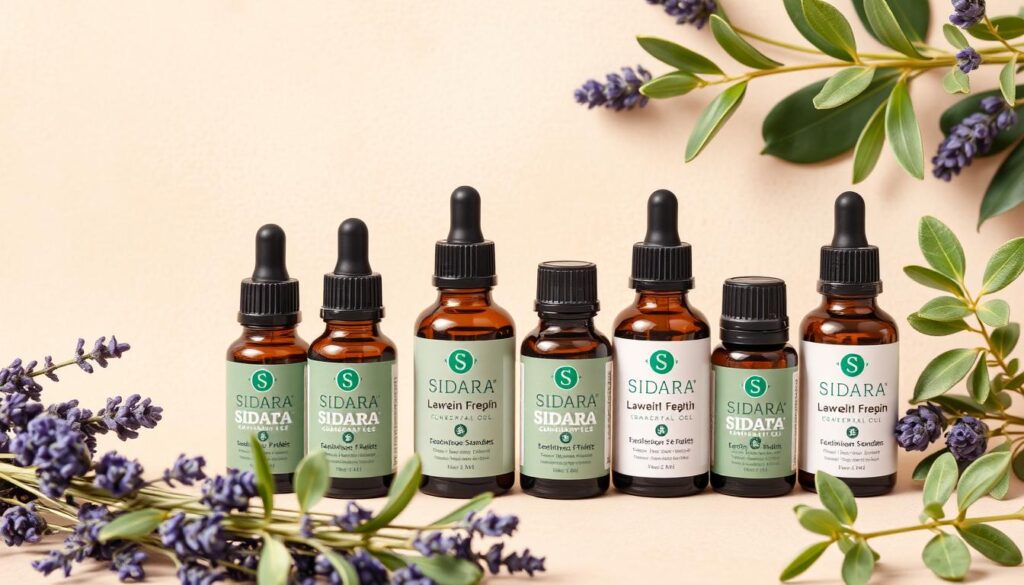
“The safe use of essential oils requires knowledge, caution, and respect for their potency.”
Essential Oil Blending and Synergy Effects
Blending essential oils can create amazing effects. Lavender and bergamot together help you relax deeply. Peppermint and eucalyptus support your breathing.
Try the “Relaxation” blend for calmness. It has ylang-ylang, lavender, myrrh, rosewood, tangerine, and bergamot. It makes you feel more relaxed.
Find your own special blends. The “Vitality” blend is full of energy. It has frankincense, palmarosa, lavender, bergamot, cypress, geranium, and sage.
Essential oils have trillions of molecules per drop. The right mix can be magical. But, blending needs care to avoid surprises.
Stick to tested blends for the best results. Use them in diffusers, apply them to your skin, or add them to your daily life. Essential oil blends can greatly improve your well-being.
FAQ
What are essential oils and what are their therapeutic properties?
How are essential oils produced and what makes them so potent?
What are the key benefits and uses of popular essential oils?
How can essential oils be used in aromatherapy?
How should essential oils be applied topically?
How can essential oils support mental and emotional well-being?
What are the physical health benefits of using essential oils?
How can essential oils be incorporated into daily life?
What are the safety precautions and contraindications to consider with essential oils?
How can essential oils be blended for enhanced benefits?
Source Links
- 11 Essential Oils: Their Benefits and How To Use Them
- Your Essential Guide To Essential Oils
- Essential Oils: A Beginner’s Guide to Aromatherapy
- Essential Oils 101: Unlocking the Power of Nature’s Remedies
- Understanding Chemotypes for Essential Oil Safety
- Health Benefits of Essential Oils
- Essential Oils Benefits and Uses Chart
- Top 10 Essential Oils and How to use them
- Categories of Essential Oils & Their Benefits – Families & Notes
- The Art of Aromatherapy : A Guide to Using Essential Oils for Health and… 9780517120675 | eBay
- The Art of Aromatherapy
- Essential Oil Safety – Dilution & Internal Use | aromatics.com
- Blending and Diluting Essential Oils – Tips for Safety and Comfort
- Dilution for essential oils – Tisserand Institute
- 5 Essential Oils for Emotional Balance
- Essential Oils for Mental Health | Solara Mental Health
- Aromatherapy: Do Essential Oils Really Work?
- What Are Essential Oils, and Do They Work?
- Essential Oils Benefits and Uses Chart
- 12 Top Essential Oils and Their Uses | Optimal Health & Wellness Chiropractic & 24hr Fitness Center
- The Master List of Essential Oils | doTERRA Essential Oils
- Safety Guidelines – Tisserand Institute
- Are Essential Oils Safe? 13 Things to Know Before Use
- Essential Oil Blends vs. Synergies — and how to make your own — Ivy+Light
- Essential Oil Blends

